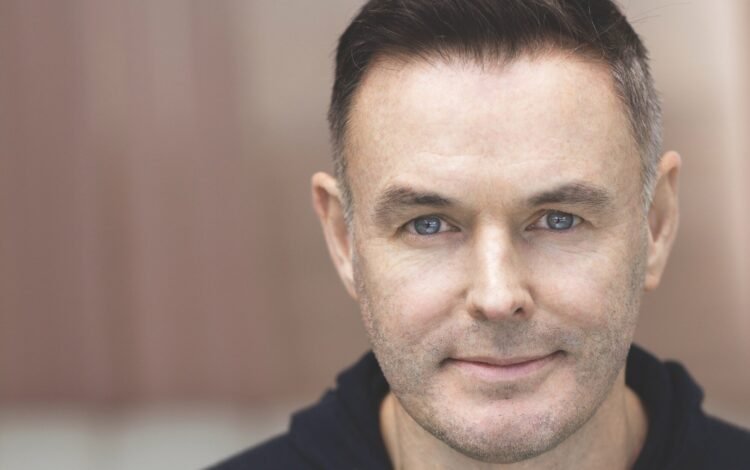A year ago, Karl Walsh was asked to give a talk at his old high school.
It was a chance to talk about his journey from his own school days in Ireland to the top of the corporate tree and discuss a career that had already taken him through such varied roles as a management consultant with Accenture; chief digital officer at jewellery firm Pandora and department store JCPenney; and CEO of Bodybuilding.com, to name but a few.
At the end, one of the kids asked him if he thought he was better at his job because he’d worked in so many different industries.
“It was an interesting question from a 14-year-old,” Walsh grins. “Because the answer is yes, but it’s a highly risky route to take, so I didn’t want to tell a 14-year-old to do it! But, having started in consultancy, the one thing I learned is, every industry thinks it’s different, and they’re all correct except for one thing: they’re all the same, in that they have similar differences…”
Walsh’s career has now taken him into yet another new avenue, and one whose residents certainly like to think they’re unlike every other business out there: the music industry.
He first joined Warner Music Group as EVP, Global Head of Commerce in 2023 and [in 2024] stepped up to become President of WMX, Warner’s sprawling services, merch, brand partnerships and fan-experience division. And he maintains that this is the job he’s been waiting for all his life.
“Everything I’ve done to this moment all ties up in a bow in this role,” he declares. “All the logistics operations, supply chain distribution, e-commerce, merchandising, all with client services at the centre of it.”
He had no experience of the music industry prior to joining Warner, saying that “the idea of following my passion was not really on the table” as he grew up.
But that’s not to say he’s not a fan. His first gig was as a lone 13-year-old, watching the Beastie Boys in Dublin (“It was all moshing, I was petrified!”). His second was a couple of years later at Oasis, a band WMX has just signed a merch partnership with for their hotly anticipated ‘Live 25’ tour next year.
“The worst part of it is people asking for tickets!” he laughs. “Roy Keane used to talk about how the worst thing about being Man Utd captain was the tickets on the day of the game – that’s Oasis now!”
Winning that deal with Oasis – a band with no group history with Warner, although Liam Gallagher is signed to WMG for both records and publishing – is a declaration that the new WMX means business.
The band were no doubt impressed by the division’s staggering range of eye-catching recent merch partnerships, some of which make perfect sense (the brilliant Green Day/Dickies collab) while others seem charmingly counter-intuitive (The Grateful Dead and Rawlings baseball mitts, anyone?).

WMX was launched under Maria Weaver as “a next generation services unit” in 2021, replacing the old WEA division and including then-Warner-owned media properties such as UPROXX and HipHopDX.
Three years on amidst CEO Robert Kyncl’s wide-ranging WMG restructure, Weaver has gone, the media titles have been sold and the new WMX, Walsh admits, is rather closer to the old WEA.
His ambitions for the division remain sky-high, however. He’s retained the lightning-quick patter and confident jargon-speak of his corporate retail days, and he’s certainly a convincing salesman for the unit.
To that end, he’s currently on a “tour of duty” around Warner’s labels and international affiliates – MBW catches up with him in Los Angeles – to make sure everyone knows what to expect from the new WMX proposition.
But first, it’s time to sit down with MBW and talk Oasis, superfans and why competition doesn’t bother him one little bit…
Is your vision for WMX very different to the original?
The thing we’re really focused on in this iteration of WMX is, we’re here to support the labels in supporting the artists.
There was a conscious decision made in the spring, of stepping away from the core content marketing media sides of WMX and saying, ‘Do you know what, the labels are there to market artists, let’s focus on those central operating pieces that the labels and artists really rely on us for’.
So, we’re laser-focused on getting merch right for our labels and artists, physical and digital distribution, VIP experiences for artists, how we can leverage Songkick to support our artists and their goals… I wouldn’t call it a narrow focus, but it’s a very clear focus on what we do and don’t do.
Why did Warner decide to sell the media properties, which appeared to be reaching a large audience and bringing in considerable revenue?
That decision predated me but where I saw value in it is, WMX is a large division that had a very large remit. When I met with artists and managers after I took the role in the summer, there were times when they asked for absolute clarity on what we do for them. There were some areas where they thought we could do more.
We just thought, ‘Let’s really focus on the things labels and artists are asking of us, and be world class at doing those things, and not try to be all things to all people’. While the media business brought in revenue, it wasn’t part of the core focus of what WMX does.
The Oasis deal must have been highly competitive, how did you win the day?
I give a lot of credit to our UK team, with [Warner Music UK chairman/CEO] Tony Harlow leading the charge.
We have a long relationship with Liam, who’s with us as a solo artist.

The band themselves aren’t signed to WMG for recorded music, but it’s a cultural moment, it’s relevant, it’s a huge capability building exercise.
We offered what we knew we could deliver, we benchmarked it against previous tours we’ve done for major artists. We didn’t go too far, we bid very fairly and practically.
The press release mentions “fan experiences” and “brand collaborations”. Are they on board with this brave new world?
Yeah. They’re excited about it. When we did the pre-sale for tickets, we saw a lot of pent-up demand, from what I saw, we could have sold a lot more. So pop-up stores in cities and around venues will allow that excess demand to engage with the band and let people feel part of it, even if they can’t get to the gig.
We’re doing VIP experiences at the events to allow superfans to come in early and engage and feel part of the Oasis experience. But we’re not doing something totally separate to the tour, we’re creating experiences around the tour that get either your superfans closer or maybe your less superfans to be part of it.
‘Superfans’ is the industry’s new buzzword. How do you feel about that concept?
You have to have a definition to work around, because you need somewhere to allocate your capital and make investments. At the same time, we need to look at the data every day and how people behave, and you need to keep evolving.
We have merch stores where people are spending money on physical music and merch for an artist; I think they’re superfans, or at least buying gifts for a superfan. On Songkick, people come to look for tickets; they’re music superfans, but are they necessarily superfans of the concert they’re going to? I’m not sure.
We need very different approaches and mindsets for different artists at different stages of their growth. It’s not a one-size-fits-all thing, and it’s not one set of methods.
How do you balance things so superfans aren’t exploited?
I’ll give you VIP experiences as an example. Some of our best artists really struggle with it.
On the one hand, they want to offer their superfans this VIP experience to come and have a more robust experience than they would if they just showed up with a ticket and lined up. On the other hand, they don’t want to ask people to pay more, because it feels like gouging them.
But if you don’t ask people to pay more, how on earth do you figure out who gets it? Robert [Kyncl] has referenced the fan app [that Warner is building], but we’re working on ways to understand loyalty to an artist and somehow use that to help them work out who gets access to what.
In the end, it’s really about the artists, what they want to do and how they understand their fans. I’m only in this role six months so I haven’t spent a lot of time with as many managers as I’d like, but I’m yet to meet the manager who’s like, ‘Who cares? Let’s just make more money off this and deal with the repercussions later…’
They’re all very understanding that this is a journey with the fans, which makes our job much easier.
What makes for a truly successful brand partnership?
Brand partnerships do well when we work with the label – we do brand partnerships for the UK through [WMX UK GM/Warner Music SVP, International Brand Partnerships] Bob Workman and Bob is with the labels there – and Bob, the label and the artist manager are all in lockstep that this is the right partnership.
“When somebody goes after revenue for their future bonus, that’s when it doesn’t work .”
When somebody goes after revenue for the sake of their future bonus and manages to convince an artist to do a brand partnership, that’s when it doesn’t work.
Do some artists really make more money from brand partnerships than they do from recorded music?
If you think about the investment the label makes in A&R, upfront advances, developing the artist… It’s a lot of effort and money.
When you get to the level of being a successful artist, you’re making a hell of a lot more money off a brand partnership or merch than you are streaming on a percentage basis – and you’re putting way more money into making the music than you are signing off on that T-shirt or that brand partnership.
So, I would imagine from an ROI perspective, when you’ve got to the stage where you can do brand partnerships and merch, it’s a far more lucrative place to spend time, because it’s way less energy for way more return.
“Artists understand that this is a place where they can truly engage with the fans, whether it be brands or merch, and make really good margin, so maybe they’re more excited about it than people outside the industry would realise.”
But it wouldn’t exist without the streaming and all the effort the label put into you. It’s like the gravy – you can get all of this because you did all of that, but don’t forget ‘all of that’ is the fuel that sells the T-shirts and the partnerships.
But artists understand that this is a place where they can truly engage with the fans, whether it be brands or merch, and make really good margin, so maybe they’re more excited about it than people outside the industry would realise. That’s where WMX has a really important role and we need to take that responsibility seriously.
Have tech advances such as the metaverse become as important as people expected?
It’s slower than people thought it would be a few years ago. In my days in omnichannel retail, it was always about meeting the fan where they wanted to be.
As younger artists break and [attract] younger demographics living more in the metaverse and online, you’ll see us move to gaming and ways to sell merch within games. That world will grow. But you don’t take the David Bowie rights and try and do it in the metaverse, because his fans aren’t in the metaverse.
We’ve seen this with VHS vs Betamax; being too early doesn’t necessarily mean you win. You might have spent a lot of money on the wrong technologies and then you’re scrambling.
We have to grow with the audience and not make commitments we can’t keep. But we can’t take our eye off it either, and find we’re years behind our competitors. So we’re building the datasets and the capabilities to be ready to pounce when the audience is ready. We will, of course, make important investments in innovation, but they will be be deliberate and focused, such as in the fan app, versus chasing every trend.
How do you feel about your competition?
I pay very little attention to them. There are so many people in my building who used to work for the other two, and there are so many people in the other two who used to work for us.
The work is our marketing; if we do great work, the managers will give us other bands. I don’t need to go out there fighting with people who are doing similar work.
I don’t see them as competition, I see them as places trying to poach my staff. And that’s a compliment, by the way, if they want my staff. They haven’t poached anybody I wanted to keep yet…
How about the competition for artists?
Chasing third party revenue for revenue’s sake is not interesting for us. What we do have capacity and aptitude for, and interest in, is a third party [partnership] where it’s right. Oasis is a great example, and we do a lot of work with Korn.
“Chasing third party revenue for revenue’s sake is not interesting for us.”
What we’re not going to do is just offer up a lower rate to get the business, because that shouldn’t be why they’re coming to us.
We would take on 10 amazing partners tomorrow if they came through the door, but what we’re not going to do is beg somebody to come and do it at a low margin, just because we want that name on our roster. It needs to be a sustainable business.

This article originally appeared in the latest (Q4 2024) issue of MBW’s premium quarterly publication, Music Business UK, which is out now.
MBUK is available as part of a MBW+ subscription – details through here.
All physical subscribers will receive a complimentary digital edition with each issue.Music Business Worldwide






